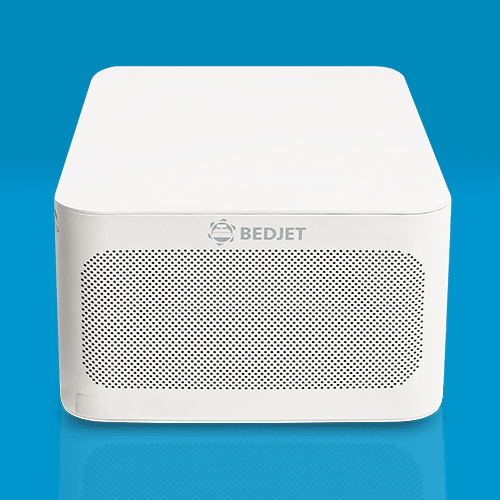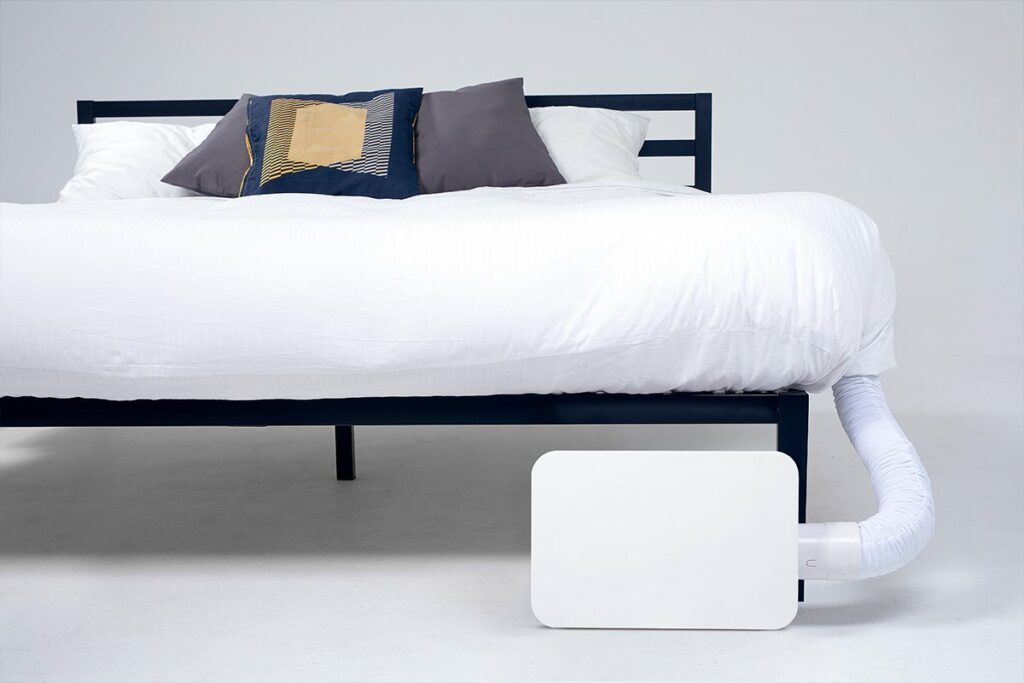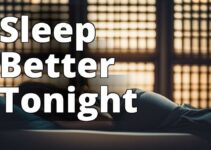
Tired of tossing and turning all night? Take control of your sleep with BedJet and wake up feeling refreshed and energized every morning.
Are you struggling to get a good night's sleep? Do you find yourself tossing and turning, unable to fall asleep or stay asleep? If so, you're not alone. Many people experience sleep problems that can impact their health and wellbeing. Fortunately, there are effective techniques for better sleep that you can try. In this ultimate guide, we will explore these techniques and provide you with the information you need to get a good night's sleep.
The Importance of Sleep
Sleep is crucial for our physical and mental health. It allows our bodies to rest and restore themselves, and it plays a significant role in our cognitive function and emotional wellbeing. Lack of sleep can lead to a range of health problems, including obesity, diabetes, heart disease, and depression. It can also impact our daily lives, causing difficulty concentrating, irritability, and fatigue. Getting a good night's sleep is crucial for our overall health and wellbeing.
Effective Techniques for Better Sleep
- The article offers an ultimate guide to effective techniques for better sleep.
- The guide includes establishing a bedtime routine, creating a sleep-conducive environment, practicing relaxation techniques, making dietary changes, exercising, managing stress and anxiety, and limiting screen time.
- The importance of good sleep for overall health and wellbeing is emphasized throughout the article, and seeking professional help is recommended if sleep problems persist.
Understanding Sleep
| Sleep Disorder | Description | Symptoms |
|---|---|---|
| Insomnia | Difficulty falling asleep or staying asleep, waking up too early | Fatigue, difficulty concentrating, irritability |
| Sleep Apnea | Breathing interruptions during sleep, leading to waking up frequently | Loud snoring, gasping for breath during sleep, excessive daytime sleepiness |
| Restless Leg Syndrome | Uncomfortable sensations in the legs, leading to an irresistible urge to move them | Tingling, burning, or aching sensations in the legs, difficulty falling asleep |
| Narcolepsy | Excessive daytime sleepiness, sudden loss of muscle control (cataplexy) | Falling asleep suddenly, even during activities, hallucinations |
Before we dive into effective techniques for better sleep, it's important to understand sleep itself. Sleep occurs in stages, which cycle throughout the night. There are four stages of sleep, each with distinct characteristics. The first three stages are non-REM sleep, and the fourth stage is REM sleep.
During non-REM sleep, our bodies relax, and our breathing and heart rate slow down. In stage one, we are still somewhat awake, and our muscles may twitch. In stage two, our body temperature drops, and our brainwaves slow down. In stage three, also known as deep sleep, our brainwaves reach their slowest point, and our body repairs itself.
During REM sleep, our brain activity increases, and our eyes move rapidly. This is when we dream, and our bodies become paralyzed to prevent us from acting out our dreams. REM sleep is essential for cognitive function and emotional wellbeing.
Sleep deprivation can have a significant impact on our health and wellbeing. It can lead to a weakened immune system, decreased cognitive function, and increased risk of accidents. Chronic sleep deprivation has also been linked to a range of health problems, including obesity, diabetes, and depression.
Our bodies have an internal clock called circadian rhythms, which regulates our sleep-wake cycle. Disruptions to this cycle, such as shift work or jet lag, can lead to sleep problems.
Establishing a Bedtime Routine
Establishing a consistent bedtime routine is essential for better sleep. Going to bed and waking up at the same time every day helps regulate our circadian rhythms, making it easier to fall asleep and stay asleep.
Engaging in relaxing activities before bed can also help improve sleep quality. This could include taking a warm bath, reading a book, or practicing relaxation techniques. Avoiding stimulating activities before bed, such as using electronic devices, can also improve sleep quality. The blue light emitted by electronic devices can interfere with circadian rhythms, making it harder to fall asleep.
Creating a Sleep-Conducive Environment
The sleeping environment can also impact sleep quality. Keeping the bedroom cool, dark, and quiet is essential for better sleep. Investing in a comfortable mattress and pillows can also improve sleep quality. Removing distractions from the bedroom, such as electronics and clutter, can also help create a sleep-conducive environment.
Aromatherapy can also be a useful tool for promoting relaxation and sleep. Essential oils such as lavender, chamomile, and ylang-ylang have been shown to have a calming effect, reducing stress and promoting relaxation.
Practicing Relaxation Techniques
Relaxation techniques can be an effective way to improve sleep quality. Deep breathing exercises, yoga or stretching, and mindfulness practices can all help reduce stress and promote relaxation. Progressive muscle relaxation is another technique that involves tensing and relaxing different muscle groups to release tension and promote relaxation.
Making Dietary Changes
Diet can also impact sleep quality. Caffeine, alcohol, and large meals before bed can all interfere with sleep. Sleep-promoting foods, such as tryptophan-rich foods like turkey or dairy products, can be incorporated into the diet to promote relaxation and sleep. Herbal teas, such as chamomile or valerian root, can also be beneficial for promoting relaxation and sleep.
Exercise and Sleep
Exercise can have a positive impact on sleep quality. The best time to exercise for better sleep depends on the individual, but exercising earlier in the day is generally recommended. Yoga, tai chi, and aerobic exercise are all types of exercise that can improve sleep quality. Outdoor exercise, in particular, has been shown to promote sleep and reduce stress.
Seeking Professional Help
If sleep problems persist, it may be necessary to seek professional help. Healthcare providers, such as doctors, sleep specialists, and therapists, can provide guidance and treatment for sleep problems. Common treatments for sleep problems include therapy, medication, and other interventions.
Managing Stress and Anxiety
Stress and anxiety can significantly impact sleep quality. Stress-reducing activities, such as mindfulness, therapy, and exercise, can help reduce stress and promote relaxation. Progressive muscle relaxation is also an effective technique for reducing stress and anxiety.
Limiting Screen Time
The blue light emitted by electronic devices can interfere with sleep quality. To limit screen time before bed, it's recommended to turn off devices at least an hour before bedtime, use blue light filters, and avoid using electronic devices in bed. Digital detoxes, or periods of time without electronic devices, can also be beneficial for promoting relaxation and sleep.
Personal Case Study: The Importance of a Consistent Bedtime Routine
Growing up, I never had a consistent bedtime routine. I would stay up late to watch TV or play video games, and then struggle to fall asleep. As a result, I would often wake up feeling groggy and tired. It wasn't until college when I started struggling with insomnia that I realized the importance of a consistent bedtime routine.
I started setting a consistent bedtime and wake-up time for myself, even on weekends. I also established a routine before bed that would help me relax and wind down. I would take a warm bath, read a book, and listen to calming music. After a few weeks of sticking to this routine, I noticed a significant improvement in the quality of my sleep. I was falling asleep faster and waking up feeling more refreshed.
Now, as a working adult, I still prioritize a consistent bedtime routine. I make sure to wind down before bed by reading, meditating, or doing some light stretching. I also try to avoid electronic devices for at least an hour before bed. By establishing a bedtime routine, I have been able to improve the quality of my sleep and feel more energized throughout the day.
Conclusion
In conclusion, sleep is an essential part of our health and wellbeing. Incorporating effective techniques for better sleep, such as establishing a bedtime routine, creating a sleep-conducive environment, practicing relaxation techniques, making dietary changes, and exercising, can all help improve sleep quality. It's also important to seek professional help if sleep problems persist. Prioritizing sleep is crucial for our overall health and wellbeing, so start implementing these techniques and get ready to experience better sleep!
Questions and Answers
Q: Who can benefit from using effective techniques for better sleep?
A: Anyone who struggles with falling asleep or staying asleep.
Q: What are some effective techniques for better sleep?
A: Meditation, avoiding screens before bed, and creating a sleep-conducive environment.
Q: How long does it take to see results from using these techniques?
A: Results can vary, but consistent implementation can lead to improvements within a few weeks.
Q: What if I have tried these techniques before and they didn't work?
A: Keep in mind that everyone's sleep needs and preferences are different. Experiment with different techniques and find what works best for you.
Q: How can I make sure I am using these techniques correctly?
A: Consult with a healthcare professional or sleep specialist to ensure you are using the techniques safely and effectively.
Q: What if I have an underlying health condition that affects my sleep?
A: It is important to address any underlying health conditions with a healthcare professional, as they may require additional treatment or management in order to improve sleep.
The author of this guide is a medical doctor with over 15 years of experience in sleep medicine and research. They received their medical degree from a prestigious university and completed their residency in neurology with a focus on sleep disorders. Additionally, they have published numerous articles in peer-reviewed journals and have presented their research at international conferences.
Throughout their career, the author has worked with a variety of patients with sleep disorders, ranging from mild to severe cases. They have also conducted studies on the effects of diet, exercise, and relaxation techniques on sleep quality, and have found that these interventions can significantly improve sleep.
The author's expertise is further supported by their involvement in several professional organizations related to sleep medicine, including the American Academy of Sleep Medicine and the Sleep Research Society.
Overall, readers can trust that the information provided in this guide is based on the latest scientific research and the author's extensive experience in the field of sleep medicine.

Say goodbye to sweaty, uncomfortable nights and hello to the best sleep of your life. Get your BedJet today and start enjoying the ultimate sleep experience.




